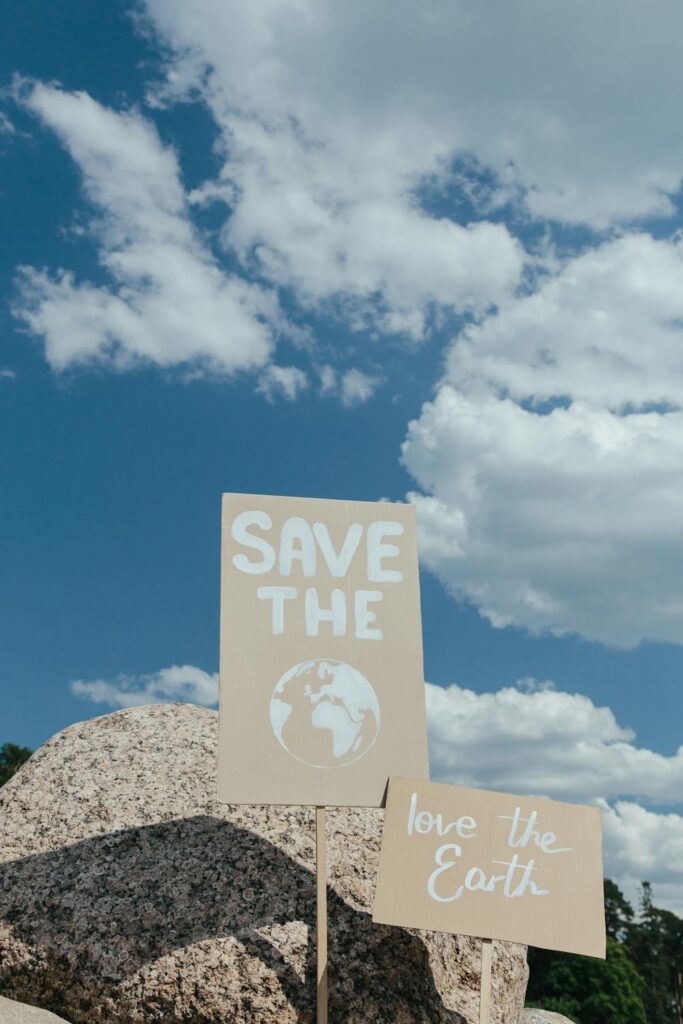Climate change, increased pollution and resource depletion are issues far more important than the next “big trend,” though many people seem to look past it. From increased temperatures, more extreme weather, high health risks and lack of replenishable resources, these global issues are destroying our planet. But you might be thinking: “What can one person do to combat this?” To answer simply, the role of an individual in larger environmental efforts are more important then we may even realize. And when this effort turns into a collective push, real change begins to happen.
There are hundreds of ways individuals can practice sustainable living techniques to reduce their carbon footprint and help the environment. Such as, limiting single use plastics or choosing sustainable transportation.
Over the past ten years, a push to reduce single use plastics–such as grocery bags and straws–has been in effect in over ten states. Regardless, these acts alone are not nearly enough. People across the country must choose to consistently opt for reusing or reducing their plastic uses in states without plastic bans, or even increase their efforts in states with the bans. In the state of Pa. many organizations report that recycling has increased since 2022 and more than 90% of the state has access to recycle locations. With this, however, it is shocking to see how few students recycle on college campuses, like Eastern University. Many similar schools reported that less than 20% of their students recycle, with similar numbers for off campus or apartment style living. Students note that the universities may be at fault, as many schools refuse to pay for recycling costs and bins.
Bulk buying, from locations like Costco or Sam’s Club, is another easy way for students to reduce their waste. While it can be more expensive initially, buying in bulk will reduce plastic waste and save you money in the long run. Additionally, choosing to take sustainable transportation, such as carpooling, public transportation, or even walking, are also ways to reduce emissions. With Eastern’s small campus, this act is fairly simple. Maybe consider taking the train into the city next time, an action that will reduce your carbon footprint and increase your time to sightsee.
Overall, the act of reducing waste can be implemented in many different ways. Making the conscious effort to reduce plastic usage and motor emissions is a simple, yet positive way that individuals can promote eco-friendly practices and aim to reduce our effects on the environment.
However, in this author’s opinion, today’s acts of consumerism are more damaging and detrimental to the environment than the cars we drive or the plastic we don’t recycle. Consumerism culture has reached an all-time high, promoting a lifestyle that is focused on spending money to buy materials that are often quickly discarded. It has become so popular that many social media accounts are created to focus only on this, showing their audience the extreme measures they take when buying popular products. To combat this, it is imperative that we support local, sustainable and ethical brands.
Often thought to be more expensive than chain stores, eco-friendly companies have made efforts to reduce their prices, which made buying these products more accessible and affordable. Even if you are not able to buy entirely eco-friendly products, the choice to buy from a local company or second-hand stores rather than overseas is another easy way to reduce your consumerism. With this, though, it is important to note that many eco-friendly efforts do not need to be bought, rather it is about making choices to avoid harmful practices and instead turn to items you already have. Many eco-friendly practices believe that consumerism can be beaten with minimalism–the act of buying less and picking quality over quantity for many of your products.
The benefits of sustainable living will always outweigh the costs. On a global scale, your everyday actions can help reduce pollution, conserve resources and preserve ecosystems. At the local level, it helps build community and a sense of moral connection to the people and places around you. Even on a more personal note, the acts of eco-friendly living have extreme health benefits (such as increased exercise when walking, cleaner air and food intake) and valuable economic savings (reducing energy usage, lowering costs and bills).
It should be noted that small, everyday actions make the biggest difference when it comes to fighting environmental degradation. Attempt to change just one of your common habits that lead to waste, and instead opt for an eco-friendly alternative. Over time, continue to adapt each part of your lifestyle to reflect an environmental forward effort. Not all change needs to happen overnight, but conscious thoughts and small actions will eventually lead to big change.
For more information reach out to EU Earthkeepers, (@eu_earthkeepers on Instagram), as they provide helpful tips and tricks to clean up our Earth, and live better, cleaner lives.

